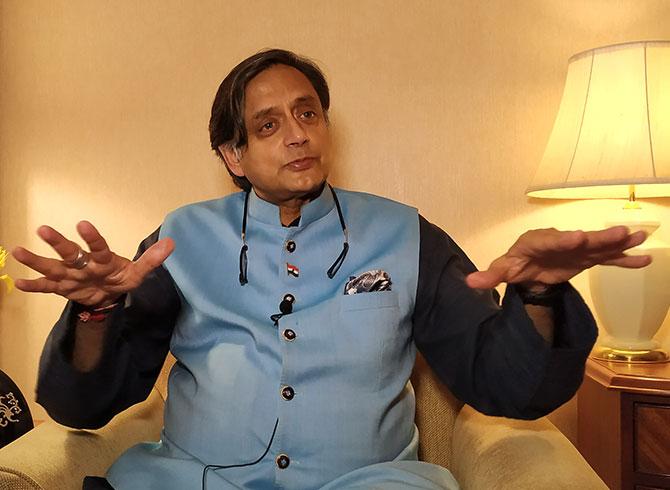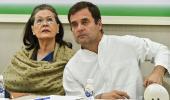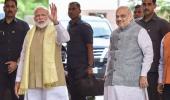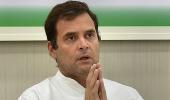'I would personally like to see Rahul Gandhi continue as party president.'
'I genuinely believe he has far more to offer to the party still, particularly in leading us in these challenging times that we find ourselves in.'

It was a fight against all odds for Shashi Tharoor, but he won the Thiruvanathapuram seatfor the third time in a row.
"While Rahulji has bravely taken full responsibility for the defeat, we are all responsible for what went wrong and we all have a responsibility to ensure the party's revival," Tharoor tells Rediff.com's Shobha Warrier.
Congratulations on your hat-trick win from Thiruvananthapuram. Was this your toughest election, tougher than even the first one?
I think each election was difficult in its own way and offered a fairly unique set of challenges each time.
The first election came on the heels of my return to India following a nearly three-decade career with the United Nations and, therefore, in many ways, I was seen as a new entrant in Indian politics and had to work extra hard to gain the trust and support of those whose votes I was asking for. That included the need to dispel the tag my rivals sought to project of me being an outsider and an anglicised one to boot!
The second election came soon after the untimely demise of my wife and there were scurrilous attempts made by rival camps to malign my character and undermine everything that I had stood for, in the most unscrupulous and undignified ways. And as my winning margin in that election showed, it really was a campaign that came down to the wire.
Similarly, during the recent elections, I faced a stiff three-cornered contest in my constituency, particularly from a well-organised, highly motivated and well-financed campaign from the Bharatiya Janata Party.
But at no point was I unduly fazed since I was campaigning on the basis of the strong development record I had successfully established in Thiruvananthapuram during my last two terms and I was confident that based on this, the voters would continue to repose their faith in my ability.
And ultimately, after putting up a spirited, effective and well-coordinated campaign, the voters rewarded us with a margin of victory that was just 7 votes less than the overwhelming majority I had secured in my first campaign.
If you were to look back now, how will you remember all the three electoral battles of yours?
I think I will certainly cherish each of these campaigns individually since they all offered their own unique sets of challenges, perspectives, highs and lows. That being said, the last campaign does indeed stand out, because if I do complete even half the full duration of my third term, I will become the longest serving member of Parliament for Thiruvananthapuram in history. And that is a milestone that would be personally very rewarding and heartening for me.
Except for a short period during UPA 2, you have been only an MP from Thiruvananthapuram. In a way, you were not able to use your talent and exposure to the affairs of the world, and contribute much to the country. Does it make you frustrated as a politician?
No, it does not -- though, of course, one would always like to have been able to do more. Still, I have been proud of the work I have done so far in Indian politics and governance, whether it was while serving the country as a minister or whether it is representing the people of Thiruvananthapuram in Parliament for over a decade now.
The latter has been particularly personally rewarding since I believe that through my hard work in and out of Parliament, my engagement with ministers and by leveraging my own personal networks, I have helped bring positive change in the lives of my constituents.
And, as they have shown in the recent elections, they continue to have faith in my ability to be the voice of their concerns and aspirations at the national level.
My writings and speeches beyond the strictly political platform have also resonated well with my constituency and beyond it, giving me a national support base.
People in Thiruvananthapuram share my values and support my stand on most issues. This has been very heartening and continues to keep me motivated to do my best in my current capacity as an 'ordinary' MP.
Did you ever wish you were there at the helm of affairs so that you could do certain things differently, different from what others were doing?
Of course -- which politician doesn't wish to exercise direct authority in government? But one also knows that politics is the art of the possible.
I think it is easy for us to look at things in hindsight and contemplate how we would have done things differently if we were in charge. But political reality has relegated me to the role I've had, and I've tried to make the best of it.
Do you feel you started your political career with the Congress at the wrong time, when the party was on its downward path?
I have never considered that to be the case. The fact remains that the core ethos of the Congress party, the values it has embodied since the freedom struggle -- in particular, its commitment to a pluralist India, inclusive growth, social justice, communal harmony, political freedom and civil liberties, abolition of poverty and the protection of the marginalised, including minorities, women, Dalits and Adivasis -- are all values that resonate very strongly with my own personal convictions.
When I took the decision to join Indian politics after returning to India, the Congress party was the natural destination and platform for me to launch my career from and I have never wavered in my belief that the party remains the most ideologically compatible base for my convictions.
Yes, the party has hit a rough patch in recent times. But let us not forget that there was also a decade before that when the UPA was in the Centre and I had the privilege of being asked to contribute during the second half of that period.
I am confident that we will bounce back and that through dedicated and committed efforts to revive the party, this patch will only be temporary.
Looking at the way dynasty of all sorts has been defeated in this election, do you think times are changing and people of India do not react kindly to dynastic politics?
I disagree. While some 'dynasts' may have lost their elections, a closer look at the backgrounds and profiles of those who fought and will now enter the 17th Lok Sabha makes it clear that dynasty politics continues to remain a reality of our political theatre.
For instance, though much has been made by the BJP in particular about how these elections were a repudiation of dynastic politics, the reality is that the BJP's slick publicity machine does well to conceal that their own leadership is filled with a generous sprinkling of these political 'dynasts', including sitting ministers and parliamentarians.
In fact, an analysis by IndiaSpend that has looked at the background of all MPs since the first Parliament in 1952 points out that since 1999, the BJP has had a comparable number of dynasts among its lawmakers to the Congress.
In 2009, these constituted 11 percent for the Congress and 12 percent for the BJP.
In the last Lok Sabha, the BJP accounted for 44.4 percent of all heirs elected to the House, including 15 percent of their total lawmakers and 24 percent of the Modi Cabinet.
This is not restricted to any one party. Recent analysis from the Triveni Centre for Political Data and CERI has pointed out that out of the new crop of MPs, a record 30 percent (162 parliamentarians) come from backgrounds of some familial political pedigree, including 25 percent of lawmakers from the BJP (Dushyant Singh, Anurag Thakur, Poonam Mahajan, two Gandhis) and even more from the NDA (two Badals, two Paswans, etc) -- a clear show of how 'winnability' trumps their own party's professed disdain for dynasticism.
Non-BJP non-Congress parties had their own dynastic success stories -- Jagan Mohan Reddy, M K Stalin, Uddhav Thackeray, to name a few.
So clearly the premise behind your question is inaccurate!

Many say dynastic politics and lack of leadership skills in Rahul Gandhi are the reason behind the decline of the Congress. Agree?
I disagree. On the specific point of dynastic politics I have already pointed out that based on the current profiles of both candidates and those who will now join the 17th Lok Sabha, one can hardly call the last elections a repudiation of dynastic politics in the country.
With regard to the issue of Rahul Gandhi's leadership, I am convinced that during the last campaign, he has led the party the front and with energy, conviction and commitment.
Each day he was in a different part of the country, reaching out to all communities in the process and addressing more rallies than even Narendra Modi.
The attempts being made in the media to pin all the blame for our electoral setback on his shoulders are simplistic and unfair and trivialise the issues we have to confront about the elections of 2019.
I think it does a disservice to the very complex challenges facing the Congress party to reduce it to a question of one person.
While Rahulji has bravely taken full responsibility for the defeat, we are all responsible for what went wrong and we all have a responsibility to ensure the party's revival.
Will the Congress now look beyond the Nehru-Gandhi family to lead the party?
I think you are asking the wrong person. I am not a member of the Congress Working Committee or somebody with organisational responsibilities and so this specific question is not something that I will be asked to contribute my opinion towards.
As I have said, I would personally like to see Rahul Gandhi continue as party president because I genuinely believe that he has far more to offer to the party still, particularly in leading us in these challenging times that we find ourselves in.
The fact also remains, that if tomorrow the party decided to hold a free and fair election among its workers for the position of party president, Rahul Gandhi would still easily beat any other interested candidate by a landslide.
That is the kind of place he has built in the hearts of the rank and file of the Congress party and therefore, to my mind he still undoubtedly remains the best person to help rally the party out of the predicament it finds itself in and help us collectively move forward.
Of course, others can rise to prominent positions in the Congress -- don't forget our last two Congress prime ministers were not Gandhis!
Still, I have no doubt that the Gandhi-Nehru family will continue to command great clout and respect within the party, just on the basis of the tremendous contributions they have made in shaping and guiding the party since Independence.
Let us never forget that two of them even sacrificed their lives for the nation. This is the proud legacy to which Rahulji is heir.
Some Congressmen say to rejuvenate the party, you need to work from the booth level to the high command. What, according to you, should be done to revive the Congress?
I do think that the Congress is rightly accused of having lost touch with the grassroots in many states and it is important for us to pay even more focus on the work at the booth level to ensure that the fundamentals of the party remain strong.
We must also decide what we stand for and do better to communicate it effectively and repeatedly.
The Congress has historically been the political embodiment of India's pluralism and have been a strong and committed voice for the preservation of secularism as its fundamental reflection.
We need to reaffirm our belief in these values and keep reiterating them at every opportunity.
At the same time, there are other areas that we must focus on, such as being a strong and constructive Opposition both inside and outside Parliament.
We need to also explore pragmatic coalitions so as to strengthen the anti-government space, while also doing our best to wield leverage on the central government through the issue of Centre-state relations.
And moving forward, we must not make the mistake of allowing the BJP to monopolise the nationalist narrative.
As the party that brought freedom to India and valiantly preserved it for decades, and therefore has critical experience in safeguarding India's national interests, the Congress must proudly articulate its own nationalism and remain vigilant on security and foreign policy issues that could be mishandled by the BJP government.
And finally, we must articulate a vision for the future that embraces the aspirations of India's majority -- the young.
A startling 40 per cent of voters this year were under 35. They need to hear what we can do for them, especially in areas where the Modi government has so far failed them, like education, skill development, and job creation.
We need to implement policies in these areas in the states we rule and then advocate them at the Centre.
Young Indians must believe we understand their aspirations and can be trusted to promote them in government.
You were a minister of state for external affairs for some time. Do you think it is a good idea to have a diplomat like S Jaishankar as the external affairs minister? Is there any difference in the way a politician and a bureaucrat look at the world?
I think there is much to appreciate in drafting an accomplished career bureaucrat like S Jaishankar, who I also have great personal admiration and respect for, into the position of external affairs minister.
I have always been a firm advocate of ability and competence in governmental office over mere electability. Such appointments in specialist areas offer the country the leverage of being able to utilise the considerable experience and skill sets that such entrants have to offer and convert them into an asset for the country.
This is particularly true for Jaishankar: His formidable experience in dealing with the Americans and Chinese, his tenure as our envoy in Washington, DC, his pivotal contribution in foreign policy during three years as foreign secretary, all suggest that the new government will have an experienced and wise hand at the helm of foreign policy and relations with the external world.
True, he is not a politician, but he will have to be elected to the Rajya Sabha and that will make him one for the occasion!
He is hardly the first such case -- do I need to remind you of the many scientists who have held ministerial office because of their expertise, or even better, of a certain distinguished economist who was drafted in as finance minister -- Dr Manmohan Singh?
Nationalism is on the rise in many parts of the world, in Russia, the US, Japan, Australia, the UK... Do you think the world is turning Right? Is disparity rising out of globalisation the main reason for that?
I do agree that the disparity in the distribution of the benefits of globalisation, the rift between the 'haves and have nots', and the backlash against immigration and cosmopolitanism, have contributed to the rise of the Right across the world.
But at the same time, I do believe that there remain very strong and credible alternatives in the world and they will eventually recover ground that has been ceded to the Right.
As a lover of cricket, do you plan to go to the UK to watch the World Cup?
Yes, indeed. I will be travelling to the UK for a few speaking engagements this month and will have the good fortune of getting to watch the India-England contest from the stadium. And, of course, as a devotee of the daily highlights shows, I will be supporting and watching our Men in Blue from whichever part of the country I am in.










